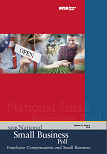Employee Compensation
·
Forty-two percent of small employers report that a majority of their full-time
employees are paid hourly wages, 32 percent report that a majority are salaried
employees and less than 1 percent report that a majority are paid on
commission. Twenty-six percent of small employers report a mix of all three
types of pay.
·
Part-time employees are predominantly
paid on an hourly basis. Forty-six percent of small employers
report that the majority of their part-time employees are paid hourly wages and
8 percent report that a majority are salaried. Thirty-four percent of small employers report that they do not employ any part-time
employees.
·
Thirty-eight percent of small employers
pay overtime to everyone who works more than 40 hours a week. Almost 35 percent
of small employers do not have any employees who work overtime. And 10 percent
determine employee overtime eligibility using common industry practices.
·
Most small businesses (53%) have no
full-time employees in exempt positions, meaning that all of
their employees are potentially eligible for overtime pay assuming employees
satisfy the salary threshold criterion. Twenty-one percent of small businesses
report that all their employees are exempt.
·
Of small employers who report having at
least one exempt employee, 44 percent indicate that some part of their
currently exempt workforce earn less than $50,440 per year and will thus become
newly eligible for overtime pay under the proposed overtime rule.
·
The vast majority
of small employers (73%) offer paid time off (PTO) to the majority of their full-time
employees, and 67 percent of them offer two weeks or more of leave. The number
of days offered is dependent on an employee’s length of service in 76 percent
of small businesses offering the benefit.
·
Over 3/4 of small employers (77%) offer
paid vacation to the majority of their full-time
employees, with 64 percent of them offering two weeks or more.
·
Fifty-six percent of small employers
offer paid sick leave to the majority of their
full-time employees with 43 percent of them offering one week or more paid sick
leave. The number of days offered is dependent on employee’s length of service
in 36 percent of small businesses offering the benefit.
·
Nearly 80 percent of small employers
offer paid major holidays to the majority of their
full-time employees.
·
Approximately 38 percent of small
employers offer a retirement plan to the majority of
their full-time employees, and about half of them offer a 401(k). Of those who
offer, 52 percent report that all their employees participate in the plan.
·
About 71 percent of small employers
offer flexible working hours for the majority of their
fulltime employees.
·
The vast majority
of small employers do not have a formal policy for handling time-off requests but
rather deal with them on a case by case basis. About 86 percent of small employers handle time-off requests due to a serious illness
or birth or adoption of a child on a case by case basis. For short periods of
time off, approximately 78 percent of small employers
handle requests on a case by case basis.
·
About half of small employers keep
records on the time employees spend out for family leave, and 43 percent keep
records on the time employees spend out on short periods of time.


